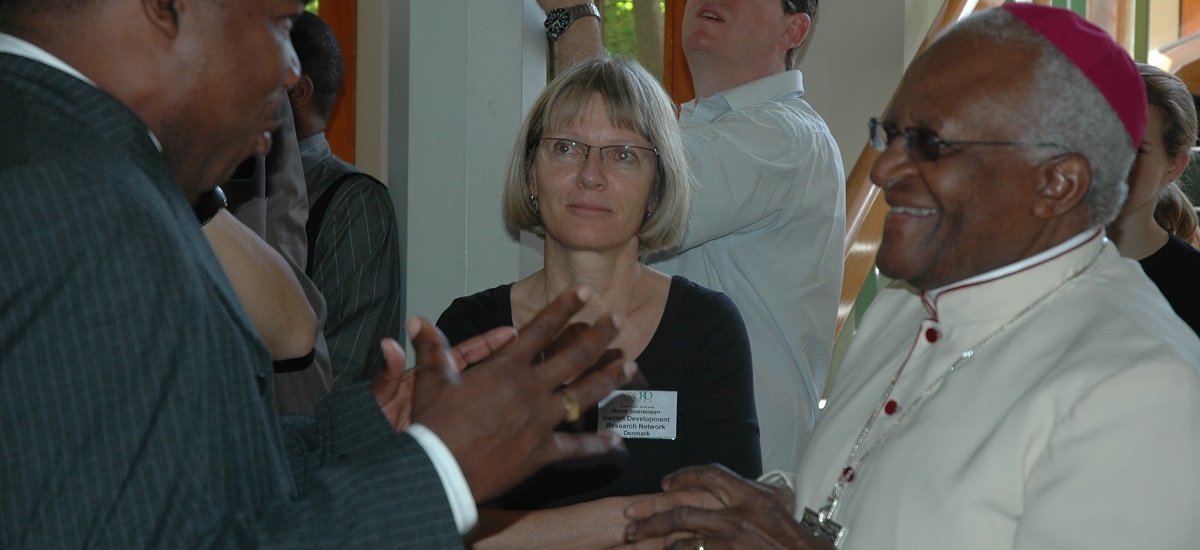Non-governmental organisations (NGOs) make use of research findings when advocating program interventions and policy reform. Anne Sørensen, who was the Chief Coordinator of DDRN 2007-2011, tells about a few examples from her present work as the Programme Manager for Education in Oxfam IBIS, Denmark. Anne Sørensen feels that a thorough mapping of research practises and research needs of development NGOs would help to set research agendas.
Anne Sørensen has a PhD in Anthropology from University of Copenhagen. After serving as the Coordinator of the Danish NGO Education Network in 2012, Anne Sørensen joined Oxfam IBIS and is today its Programme Manager for Education.
Examples of using research for advocacy
As part of a programme on education in native language in a number of countries in Latin America, data were collected and analysed to provide evidence on the legal regulation and current policies in each of the countries. For these country studies, consultants were recruited among faculty at local universities to on a short term basis.
A second example is a study covering six African countries with the objective to map gaps in performance in each country from the perspective of the targets set in Sustainable Development Goal no. 4: Ensure inclusive and equitable quality education and promote lifelong learning opportunities for all. Anne Sørensen explains that the quality of the reports compiled by the team of researchers varied substantially.
Low fee private schooling is a phenomenon of much concern to Oxfam. Poorly educated teachers, aggressive marketing, and the absence of creative subjects in school are some of the issues. A researcher in Uganda was imprisoned when criticizing low fee schools in the country, Anne Sørensen tells.
The controversy on private schooling in developing countries is also reflected in a post on Oxfams blog from 2015 authored by Prachi Srivastava, who is an Associate Professor in the School of International Development and Global Studies, University of Ottawa. Earlier, Prachi Srivastava had been interviewed by The Economist. However, the interview article was biased by the pro low fee schooling position of The Economist according to Prachi Srivastava, and in the blog post she clarifies her views. Anne Sørensen says that there is a need to define an alternative – What is the good school? – based on research.
Oxfam IBIS will carry on engaging researchers in its advocacy work. Solid documented research reports can help create momentum. Oxfam UK has extensive record of research-based studies, in the course of which the organisation has developed elaborate formats for quality control and effective communication.
However, assigning university researchers in South countries to work as short-term consultants for NGOs may have an adverse impact in relation to the long term research capacity building, which the Danish Development Agency (DANIDA) and other foreign donors fund. In Danish programs for research collaboration and research capacity building, it is common experience that South researchers not only may have a quite extensive portfolio of foreign funded projects to attend, some are also very busy consultants completing assignments for NGOs and the donor community.
Anne Sørensen suggests that DDRN undertakes a mapping of on-going research and research needs of NGOs in Denmark, which would also cover NGO suggestions on possible modalities, e.g. partnerships for research in South countries, co-hosting of PhD students, and identification of research themes in Calls for project application by research grant facilities.
DDRN will follow up on Anne Sørensen’s proposal when launching the mapping of knowledge communities in Denmark.

Vision
Oxfam IBIS is working for a just world in which all people have equal access to education, influence and resources. Together with our partners, Oxfam IBIS combats global inequality and poverty.
Mission
Locally: We strengthen individual rights and opportunities to take part in society by ensuring access to knowledge and good education.
Nationally: We support democratic development that promotes collective rights and popular participation in policy decisions to benefit the poor and oppressed groups.
Globally: We defend poor people’s interests and we find intelligent solutions to structural problems causing global economic inequality and poverty.
Values
Committed: Believe in your ideas, share them with your fellow human beings and work together to make a difference.
Critical: Ask difficult questions, seek the best answers and use your knowledge to change the world.
Responsible: Set high goals and lead by example.
Dialogue: Be open, use differences constructively and find common ways forward



